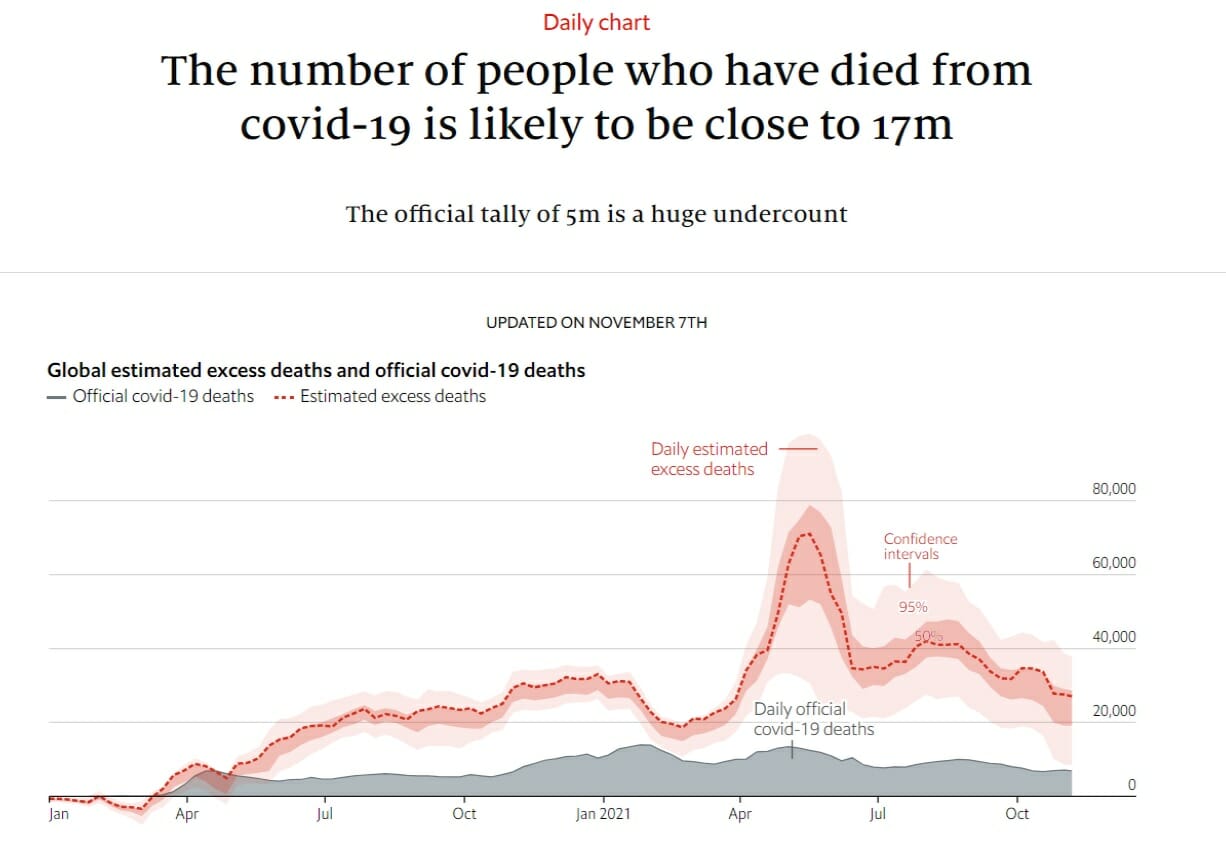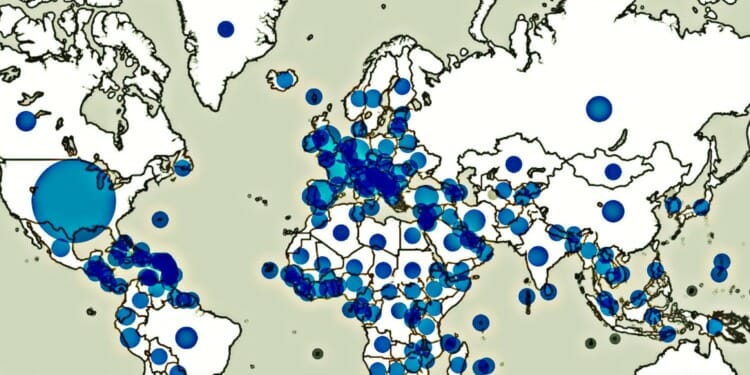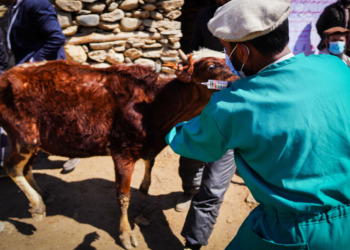The World Health Organisation sounded the alarm last week, saying that Europe as defined by WHO – the region covers 53 countries, including of course Russia but also part of Central Asia – is again the “epicenter” of the covid pandemic as a fourth wave is about to engulf it.
The director of WHO for Europe, Hans Kluge, at a press briefing on November 4, explained that the old continent is “the epicenter” of the new increases in infections and that this new fourth wave was likely to count up to 500 thousand victims by February.
WHO blamed near-record caseloads on insufficient vaccine take-up. Portugal is the only country in Europe where nearly everyone eligible has been vaccinated. But in other European countries, the proportion of the vaccinated to total population has settled at much lower levels.
Mr. Kluge also pointed the finger at the relaxation of public health measures for rising infections in the European region, noting that so far the WHO has recorded 1.4 million deaths across the region.
Compare this to a total of 5 million deaths globally, a number that was reportedly reached on November 1 – although the Economist argues that this is an official figure that vastly underestimates the real number of deaths which it has calculated to be closer to 17 million (this is arrived at taking into account the number of “excess deaths” compared to pre-pandemic years):

Whatever the real number, there is little doubt that the number of infections, after a summer pause, is now rising across the European region. There is of course nothing new in this latest warning from the WHO that has never tired of repeating that the pandemic is far from over and must be managed as an emergency.
The European Union for its part, historically attached the precautionary principle as a key element in good governance, especially in all matters dealing with public health, has always followed the lines of greater prudence, allowing itself a pause this summer as vaccination rates increased and there was a seasonal drop in the number of contagions. However, now that the fourth wave of Covid-19 is upon us, the debate on how best to address it has heated up again.
Germany is currently the “sick man of Europe” with over 40,000 new cases per day
In Germany, the fourth wave is shaping up to be a “pandemic among the unvaccinated” says its health minister Jens Spahn, as insufficient vaccination rates have caused an alarming increase of over 40 thousand new cases per day. Today, Germany’s coronavirus infection rate climbed to its highest recorded level yet. To date, only 66.23% of the population has been immunized, and just 68.87% have received at least one dose. If the pandemic situation worsens, “Further restrictions are possible for those who are not immunized,” said federal government spokesman Steffen Seibert – though nobody wants to bring back tough lockdown measures.
German health experts are pushing for a campaign giving priority to vaccinating vulnerable groups (older people and those with health antecedents) rather than focusing on booster shots or raising the average level of vaccination in the population. The fact that Germany still hasn’t a new government complicates the matter. The three parties in negotiations to form a coalition government are presenting new proposals later today. Die Welt reports that among the measures could be the return of free coronavirus tests and compulsory vaccination for health care workers and teachers.
Eastern Europe, an epicenter in the epicenter
While infections are rising everywhere across Europe, the rise is especially noticeable in Eastern Europe. Russia is right on the heels of Germany, registering around 40,000 cases daily – 41,335 cases today – according to Tass, the official news agency but the covid crisis began in summer, earlier here than anywhere else, picking up by mid-September. Again, a result of excessively low vaccination rates even though Russia has developed its own vaccine Sputnik – but Russian citizens, despite government efforts and Putin’s promise that it is an effective vaccine, systematically avoid it. Only one-third of the population is vaccinated.
Such a situation raises the political specter of Covid 2020 for all European leaders: How to ensure the containment of contagions without negatively impacting the economy. To be more explicit, how to avoid a boom in Covid cases, intensive care and deaths without closures and restrictions that have caused economic production to crash, jobs to be lost along with a whole range of personal and family problems for citizens, from how to keep schools open to how to avoid psychological damage.
Austria offers a tougher approach while Italy’s Green Pass may be a model for a European response
Italy is starting to look like a model to follow in light of the good results (so far) obtained with its Green Pass policy. At first, when it was launched, many in Europe criticized it as too repressive. But now, seeing the positive results of the Italian experience, the idea of Covid 19 digital certificate is being seriously studied as a compromise solution that enables economic activities to be pursued unimpeded without losing sight of the control of contagions; at the same time, having a “Green Pass” does not impose too stringent measures on vaccinations.
Italy is not exempt from the rise in cases, but the numbers and the incidence are lower than the average that is being recorded in other EU countries. This argues in favor of the obligation to show the “green certificate” to have access to places of work and social life. The German Health Minister, Jens Spahn, has praised the punctuality of the controls carried out during the days of the G20 in Italy, compared to the milder approach of his own Germany.
However, across Italy’s northern border, Austria is leaning towards an even more stringent approach. The idea also supported elsewhere across the continent, is of a limited lockdown aimed at the unvaccinated: limitations on them would range from the prohibition of entry into offices or other public areas to a more drastic scenario of limitations on freedom of movement. Starting today, Austria will prohibit unvaccinated patrons from entering cafés, restaurants and large events
This of course is likely to trigger new tensions in countries where the anti-vaxxers are numerous, including in France and Germany, but it could have an effect similar to that of the Italian Green Pass: It could lead to a rise in the number of vaccinated as people opt for maintaining their freedom of movement and, therefore, we would achieve a decrease in hospitalizations and victims.
No matter what strategy is adopted, expansion of vaccination rates is going to be key, including booster shots – especially important to protect against the rapidly spreading delta variant. If that is not done, the pandemic cannot be controlled and the fourth wave could turn out to be as bad as the first. In Italy, the vaccination campaign has already entered into full swing and in the fourth wave, for now, Italy seems to set an example rather than being “the sick man of Europe” as it was in the first wave, two years ago.
Editor’s Note: The opinions expressed here by Impakter.com columnists are their own, not those of Impakter.com. — In the Featured Photo: WHO Coronavirus Dashboard










